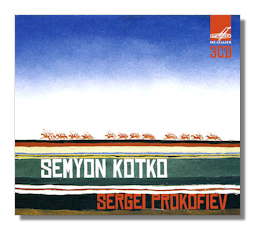
The Internet's Premier Classical Music Source
Related Links
- Prokofieff Reviews
- Latest Reviews
- More Reviews
-
By Composer
-
Collections
DVD & Blu-ray
Books
Concert Reviews
Articles/Interviews
Software
Audio
Search Amazon
Recommended Links
Site News
 CD Review
CD Review
Serge Prokofieff

Semyon Kotko, Op. 81
- Semyon Kotko - Nikolai Gres
- Semyon's Mother - Tamara Yanko
- Sofia - Lyudmila Gelovani
- Tkachenko - Nicolai Pantchekin
- Frosya - Tamara Antipova
- Khivrya - Antonina Kleschyova
- Remeniuk - Gennady Troitsky
- Tsaryov - Mikhail Kiselev
- Lyubka - Tatiana Tugarinova
- Ivasenko - Daniil Demyanov
- Mikola - Nikola Timtchenko
All-Union Radio Choir and Symphony Orchestra/Mikhail Zhukov
Melodiya MELCD1002120 3CDs 184m Rec. 1960
This 1960 recording from Melodiya was the first commercial release of Prokofiev's opera Semyon Kotko. It was issued on LP by Melodiya in the 1960s and may have been available in the West from import shops during that time. In 2003 it was licensed to and issued on Chandos – a 3-CD set I have not heard. This new issue here is derived from a remastering, where the Chandos was reportedly drawn from older mastering sources. That said, if you already have the Chandos version, purchase of this new set is probably not necessary.
This performance of Semyon Kotko is a nearly complete one, having only three small cuts, one each in the last three acts. The only current competition in the work comes from Gergiev and the Maryinsky Theater on Philips (Philips 464605-2), recorded in 1999 and issued in 2000. The Gergiev was a nearly complete effort as well, with a very small cut in the last act and perhaps a few others, though you'll have to look hard to find any when you make comparisons with the Zhukov. The differences between the two recordings are quite striking: the Melodiya lasts forty-seven minutes longer and is a studio effort in very good mono sound, while the Philips was taken from several live Vienna Konzerthaus performances in reasonably good modern stereo sound.
The vast difference in the timings (184 minutes for Zhukov and 137 minutes for Gergiev) is related mainly to the rather relaxed tempos of Zhukov and the mostly very brisk ones of Gergiev: I would estimate that the latter generally paces things around thirty percent or more faster. The opera consists of forty-eight scenes (or mini-scenes), and both conductors feature all forty-eight. (The small cuts referenced above were made within the various scenes.) Gergiev's two-CD set features fifty-one tracks, while Zhukov's three discs have fifty. Well, you ask, which is the better of the two recordings?
Well first, for those unfamiliar with the opera's story, let me offer a brief plot summary. Based on the novel I am the son of working people, and featuring a libretto by the work's author Valentin Katayev and Prokofiev, the story takes place in Ukraine and centers on the demobilized soldier Semyon Kotko, quite a prominent member of his village. Though there is peace between the newly formed Bolshevik government and Germany, some German forces still occupy a portion of the territory. The Red Army is advancing but is challenged by recalcitrant Ukrainian loyalists and the remaining Germans. Semyon intends to marry Sofya, daughter of the wealthy villager Tkachenko. The latter unites with the Germans and Ukrainian loyalists in hopes of restoring the old order. He also intends to prevent the marriage of his daughter to Semyon. Tkachenko's scheming eventually costs a couple of Semyon's friends their lives. Semyon leads an attack on the Germans, saves Sofiya from marrying a loyalist, but is captured. As he is about to be executed the Red Army arrives, drives out the Germans and all ends well.
Now to answer the question I raised about which recording is the better. Both Zhukov and Gergiev have excellent singers in their respective casts, especially in the lead roles. The three female leads are especially fine in the Zhukov recording, as is Nikolai Gres as Semyon. But the counterparts in Gergiev's recording are also quite compelling. It would thus be very difficult to favor one over the other here, though if I were forced to choose, I might very slightly favor the Zhukov cast. Gergiev's brisk tempos may not always be to your taste, but I would opt for his more intense view of the opera. That said, listeners who prefer a more lush, more Romantic approach to the many soaring lyrical themes (try the one that leads off Act Three), may well prefer Zhukov: the music flows beautifully in his hands and rarely if ever does he shortchange Prokofiev's lovely melodies.
As for the sound reproduction, Zhukov's mono sound, good though it is for the time, does not capture the orchestra with the presence and power of Gergiev's, even though the latter's live environment doesn't always allow for ideal clarity. Oddly, Zhukov's singers are miked with greater presence, and so you actually hear them more clearly. Gergiev's album booklet contains the libretto and Zhukov's does not, a fact which makes comparisons with the Gergiev regarding cuts problematic. In the end, there are many pluses and minuses in both recordings, but the verdict must favor Gergiev over the classic Melodiya, especially in technical matters. That said, my recommendation would be to acquire both recordings if your budget allows. Prokofiev mavens will certainly want both, not least because the two offer such different but valid views of the opera.
Copyright © 2014, Robert Cummings





















